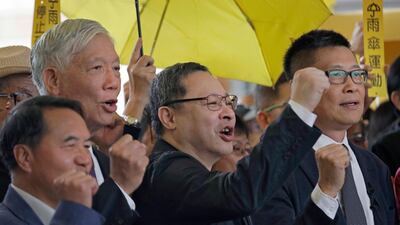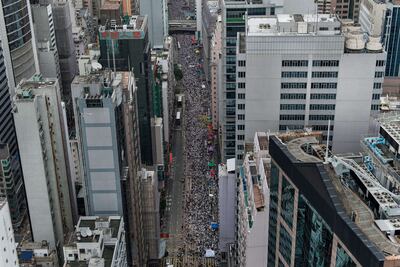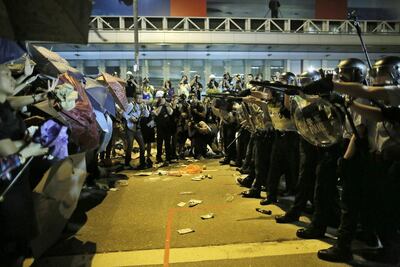On one level, it would be hard not to feel sympathy for the Occupy Nine, the political activists currently on trial in Hong Kong charged with incitement to cause public nuisance in the 2014 Umbrella Movement protests.
Weren’t they, and the thousands who joined the demonstrations, just calling on China to keep its word to preserve Hong Kong’s culture of free speech and democracy after the British handed over their former colony in 1997?
On another level, however, this is less a case of a band of plucky Davids fighting the overwhelming force of the state-as-Goliath, and more akin to Canute vainly bidding the waves to recede (and at least the Danish king knew he was demonstrating his powerlessness). For the tide of history is against all who still hope that Hong Kong might evolve into a type of western liberal democracy that just happens to be attached to a one-party Communist superpower.
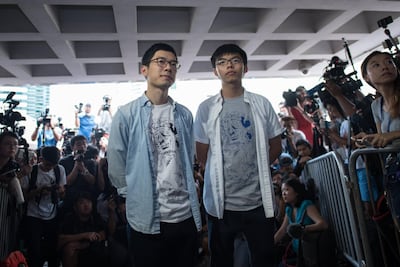
Firstly, it is important to point out that pro-Beijing lawmakers argue that the Basic Law, Hong Kong's mini constitution, is being adhered to. They say that universal suffrage is only enshrined as an "ultimate aim", that the "capitalist system and way of life" has clearly been preserved and that the unprecedented degree of public criticism allowed shows that the "high degree of autonomy", guaranteed until 2047, is a reality. Indeed, reading the barbs regularly aimed by the Hong Kong-headquartered South China Morning Post, one wonders occasionally if the editors are actually aware they are part of the motherland.
Secondly, while it is understandable for the UK to be concerned, as the former colonial power and co-signatory of the Sino-British Joint Declaration of 1984, which determined the fate of Hong Kong, it is hypocrisy of the highest order for it to complain about the failure to make further progress towards democracy. Britain had 155 years from 1842 to 1997 to implement full democracy if it had wanted to but was not moved to do so. It only initiated moves in that direction during the tenure of the last governor, Chris Patten, who irritated the Chinese – understandably – by trying to push for far-reaching reforms just before the handover.
Thirdly, while making clear the advantages of the “one country, two systems” policy devised by Deng Xiaoping in the 1980s is necessary if it is ever to lure Taiwan into a closer relationship with China, Hong Kong simply isn’t as important as it used to be. In 1997, it made up 18 per cent of China’s GDP. Now it constitutes a mere 3 per cent. Democracy proponents have seen what leverage they possess shrink accordingly.
Fourthly, it is inevitable that whatever differences and freedoms Hong Kong enjoys will be decided in Beijing, and there alone. Hong Kong is not some separate region to which China only had a vague claim. It was always theirs and only came to be ruled by Britain in one of the most shameful episodes in imperial history, in which, rather than declaring war on drugs, London fought a war for drugs – the Opium Wars. Having taken Hong Kong with menaces in the first place, the UK was lucky to have any say at all in the future of the territory, not least since most of it had to be returned after the 99-year lease ran out in 1997 in any case.
It is now very clear that the political opening-up many hoped would accompany China’s economic liberalisation has not happened and is even less likely to be on the cards under Xi Jinping, the country’s strongest leader since Chairman Mao. Why would Mr Xi grant freedoms to Hong Kong that he does not deem suitable for the rest of China? Further, whatever the letter of the Basic Law, there is also now a greater willingness in the Chinese leadership to express brute strength, memorably conveyed by a top official in 2010 when he said: “China is a big country and other countries are small countries, and that is just a fact.” Hong Kong is part of China – and that is just a fact too.
This is a point that western supporters of the democracy activists appear to overlook. The extent to which it is acknowledged in Asia, however, makes a marked comparison. I have probably attended hundreds of meetings concerning China over the last four years and I do not recall the rights and wrongs of governance in Hong Kong being raised once. That can be partly explained by the principle of non-interference in the internal affairs of other states, to which many Asian countries are signed up. More than that, however, it is widely regarded as being an issue for China – and it is as simple as that. (There is also a level of continuing resentment at being the object of finger-wagging by sanctimonious westerners, which wins China some sympathy on this issue.)
The preservation of Hong Kong's status as somewhere different, a true Special Administrative Region, as it is officially designated, is necessary if it is to remain a unique bridge to the world. Recent cases such as that of Victor Mallet, a Financial Times editor kicked out of Hong Kong for hosting a pro-independence politician at the city's Foreign Correspondents' Club, might appear to chip away at that. Talk of independence has, however, been clearly established as a red line that Beijing will not tolerate and it is not alone in cracking down on non-violent separatists, as Spain's jailing of Catalan secessionist leaders earlier this year shows.
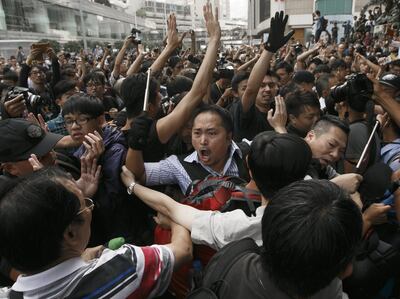
Whatever the fate of the Occupy Nine then – and let me repeat that they and their families are to be commiserated with – one other thing is clear. They are fighting a war they cannot win. Beijing will decide the future of Hong Kong. And that, too, is just a fact.
Sholto Byrnes is a senior fellow at the Institute of Strategic and International Studies Malaysia
